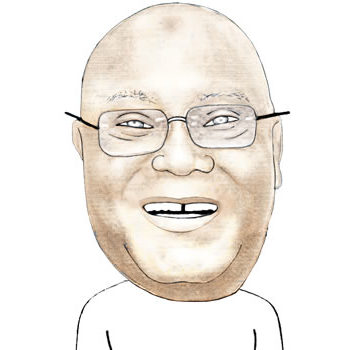The answer is simple: because I am proudly Nigerian and favour a united Nigeria that offers every man, woman and child a brighter future where each and everyone has a chance to build and share in this great nation’s potential.
The restructuring I want to see happen is changing the structure of our country to take power from the elite and give it back to who it belongs: the people. It will help to bring the benefits of the change that our people were promised in the last general elections.
For a number of years now, we have been making the case for the restructuring of our federal system. This is in response to the cries of marginalisation by various segments of country as well as the understanding that our federation, as presently constituted, impedes optimal development and the realisation of our peoples’ aspirations. As you all know, virtually every segment of this country has at one point or the other complained of marginalisation by one or more segments, and agitated for change.
Before I proceed, let me caution us all that restructuring, by whatever name, is not a magic bullet that would resolve all of Nigeria’s challenges or those of any section, region or zone of the country. Listening to some people, even those who seek to dismember the country, you would think that once their dream is achieved their part of the country or the country as a whole will become paradise.
Yet, as we all know, life is not that simple. We need restructuring in order to address the challenges that hold us back and which restructuring alone can help us address, and which will remain unaddressed unless we restructure. Period. This also answers the cynics who question whether restructuring is even important since it won’t solve all our problems. No system would.
To me, restructuring means making changes to our current federal structure so it comes closer to what our founding leaders established, in response to the very issues and challenges that led them to opt for a less centralized system.
Perhaps, it is because I spent a decade in the private sector before coming back to the public sector as Vice-President that I have the benefit of a paradigm that sees opportunity where others see crisis, but that is my world view.
The issue of restructuring is beyond resource control. There are other and even more important issues in this whole debate which I will address in this speech, but as resource control seems to be the one issue that many blocs are fixated on, let me take some time to address it first.
My vision of restructuring will not make some states richer and others poorer. Restructuring is a win-win for all Nigerian states.
So, let me make it clear beyond any possible doubt: the restructuring I am proposing will not reduce the share of our nation’s oil revenues that any state currently enjoys. However, if we are to grow our revenues we need to change the way we think of our resources and nurture them for the benefit of all.
So, let us start by not thinking as if our resources consist only of oil. Oil is not infinite. In fact, within the industry, the oil majors and multi-nationals are looking for ways to further invest in alternative energy because in the next 10-20 years the proportion of the energy market share that fossil fuels hold will shrink and almost vanish even as those of alternative energy are set to rise dramatically.
Automobile manufacturers such as Volvo and Peugeot have announced plans to phase out petrol and diesel cars. This is not a conspiracy. It is a fact. The man just elected as France’s President, Emmanuel Macron, has told the world that petrol and diesel cars will be illegal to make or sell in France by 2040. Norway has said it will do the same but earlier: by 2025.
On a recent visit to the United Kingdom, I noticed that senior members of the Conservative Party were driving the Toyota Mirai, a car that runs on hydrogen and emits water instead of harmful carbon monoxide. Professor Tony Seba, a world renowned global economist, has published his findings that all new cars will be electric by 2025.
So, the world is not waiting for us to see reason and reengineer our economy. If we do, they will work with us. If we do not, the world will leave us behind.
The whole purpose of restructuring is to eliminate those policies that feed the mindset that drives the sharing behaviour so that we can have a paradigm shift towards a mindset that drives creative and productive behaviour. We do not have to look too far. We are already seeing it in Nigeria.
I just told you that I was recently in the U.K. One of the things I learnt on that visit is that Britain is very pleased with the increase in vegetable imports from Nigeria especially pumpkin leaves. You in the Southeast call it ụgwụ. One state, Anambra, has decided to take her share of the $35.4 billion Africa spends importing food and is now exporting ụgwụ to other nations including the U.K.
Some oil producing states owe workers’ salary, but Anambra does not. A number of oil producing states took the Federal Government bailout, Anambra did not take it. Anambra state is proof that restructuring is good for our states and will not bankrupt them.
If Anambra, a state that suffers from soil erosion and has a very high population density, can export £5 million worth of pumpkin leaves to foreign nations, 1 million tubers of yam to Europe and millions of dollars-worth of scent leaves, locally known as nchụanwụ, then much larger states like Kano, Borno, Kaduna, Kwara, Ogun and Rivers should be able to do even more.
The time has come to say the truth. Whilst it might be inconvenient for our elite who are the ones profiting from the oil rent economy and the feeding bottle of our current deformed federalism, I believe we need to speak the truth. And the truth is this: our national wealth is being drained by a select few instead of building a country for all of us. It has to end. We need to return resources and power back to the local level and from the elite to the people.
Only by restructuring can we guarantee Unity, Equity and Security for our nation.
Along with the late great Chief M.K.O Abiola, I was a member of the former Social Democratic Party. The party’s manifesto included the following words, to ‘improve the people’s welfare and fight for social justice’. We in the SDP were the progressives. We were the party of Olu Falae, of Shehu Musa Yar’adua, of Abubakar Rimi, of Jim Nwobodo and of Bola Tinubu.
So, it surprises me today, and perhaps even shocks me that anybody that was elected on or connected to that platform would say he or she does not know what restructuring means.
I am proud to say that the SDP invented restructuring as it pertains to Nigeria. Our presidential candidate was a pan Nigerian patriot who promised to restructure the country. Anybody connected to that platform should be seen as making the case for restructuring simpler rather than complicating it.
Quick Wins
When people hear the term restructuring, all sorts of emotions are evoked. Why is this so? Some feel a sense of impending triumph; others feel a sense of impending loss and defeat. But it doesn’t have to be so. If our people see that restructuring will benefit all of us, some of the contentions will abate. We can move quickly to demonstrate some of those benefits with those aspects of restructuring that do not require constitutional amendment.
The excessive concentration of power and centralisation of resources in the Federal Government led the government to extend itself into virtually every aspect of our lives including as an investor in an array of businesses. And almost as a rule they were badly run. The reason is because we have made our government into an enterprise rather than a service. We no longer have civil servants in the true sense of the word. Our civil service is more lucrative than the private sector such that when people see a nice house or a fancy car they automatically think it must belong to a top government official.
Nigeria is blessed with huge oil and gas deposits, but we will not become wealthy by merely selling more crude oil or more LNG. Our wealth must be tied to the productive capacity of our people. What is in our brains beats what is in our grounds?
Let us not be afraid of any state controlling their resources as long as they pay the agreed taxes to the center. Let us rather be afraid of being so fixated on oil that we do not even see the wealth that is under our noses, and fail to realise when oil ceases to be that important.
As I mentioned earlier, oil is getting more and more redundant. We must turn our energies towards developing a real economy and not an economy based on rent seeking.
Before the discovery of oil in commercial quantities, the Saudi Royal Family received medical treatment from the University College Hospital, Ibadan. More than 50 years after the discovery of oil in commercial quantities our own leaders now depend on others for their healthcare.
So, let me now turn to the critical issue of security facing our nation’s unity and the wellbeing of our people. By devolving power to the states and local governments, the Federal Government equips them with the resources, authority and capacity to tackle local problems that has national significance. In this way it will help solve the issue of herdsmen-farmers clashes, kidnapping, militancy and other forms of insecurity that may manifest themselves as cultism or other anti-social behaviours. We should do more than merely ordering the police or the military to crush terrorists, kidnappers, cultists and separatists. We must also address the environment that allowed such issues to erupt in the first place. If you pull out the leaves of weeds without removing the weeds by the roots, they will grow again.
I believe that the benefits accruing from these first steps will help us as we move towards the changes that require amendments to our constitution.
Excerpts of a lecture delivered by former Vice-President Atiku Abubakar at the University of Nigeria, Nsukka, on the occasion of the Senior Staff Club Lecture Series on Restructuring Nigeria/Award of Excellence on Good Governance.







